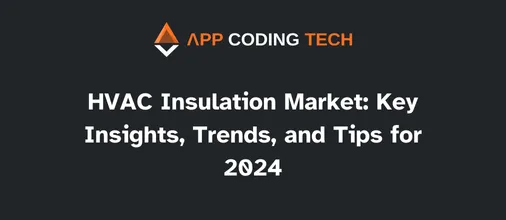DISCOVER ANY
ARTICLES HERE
All the articles and contents of the site have been up to date and
you can find your articles and content easily.

All the articles and contents of the site have been up to date and
you can find your articles and content easily.



Haseeb Khan
3 September, 2024
The HVAC insulation market plays a vital role in improving energy efficiency and reducing costs for residential, commercial, and industrial setups. With growing environmental concerns and energy-saving initiatives, understanding this market has never been more important. Whether you’re looking to install HVAC insulation or optimize your current system, here’s everything you need to know.
The HVAC insulation market encompasses materials and technologies designed to insulate heating, ventilation, and air conditioning (HVAC) systems. Proper insulation minimizes energy loss, improves indoor air quality, and reduces operating costs.
Thermal Insulation: Prevents heat transfer.
Acoustic Insulation: Reduces noise from HVAC systems.
Vapor Barriers: Protect against moisture and condensation.
The market serves industries such as construction, automotive, and healthcare, addressing both environmental and economic concerns.
Insulation reduces energy consumption by maintaining temperature consistency, resulting in lower utility bills.
Upfront investment in insulation can lead to significant long-term savings.
Reduced energy use means a smaller carbon footprint, aligning with global sustainability goals.
Insulated systems maintain consistent temperatures and reduce noise, creating a more comfortable environment.
The HVAC insulation market is evolving rapidly, influenced by technological advancements and regulatory changes. Here are some key trends:
Eco-friendly materials, such as recycled fiberglass and aerogels, are gaining popularity.
Integration with IoT allows for better monitoring and maintenance, enhancing system efficiency.
Governments worldwide are imposing stricter energy codes, driving demand for high-quality insulation.
The global construction boom fuels demand for HVAC insulation in residential, commercial, and industrial buildings.
Lightweight, affordable, and effective for thermal and acoustic insulation.
Includes polyurethane and spray foam, offering superior sealing and efficiency.
Durable and fire-resistant, ideal for industrial applications.
Reflects radiant heat, commonly used in warm climates.
Assess Your Needs: Consider energy efficiency, cost, and environmental impact.
Climate Factors: Choose materials suited for your local weather conditions.
Professional Evaluation: Consult HVAC experts for tailored recommendations.
Budget Considerations: Balance upfront costs with potential savings.
Managing payments for HVAC services can be simplified by choosing phone-based payment systems. Follow these tips to make the process hassle-free:
Choose Trusted Providers: Work with licensed HVAC companies that offer transparent pricing.
Inquire About Discounts: Many companies provide seasonal or bulk-service discounts.
Secure Payments: Use secure methods like credit cards or authorized digital payment services.
Request Detailed Invoices: Keep a record of payments for tax deductions or future reference.
Proper insulation reduces heating and cooling expenses by up to 30%.
Efficient insulation minimizes system strain, leading to fewer repairs and replacements.
Stay compliant with energy codes and avoid penalties by investing in quality insulation.
Insulated properties are more attractive to buyers and tenants, boosting resale value.
The market is expected to grow at a CAGR of over 6% from 2023 to 2030, driven by increased energy efficiency initiatives.
Insulation minimizes heat transfer, reducing energy consumption and costs.
Yes, options like recycled fiberglass and aerogels are environmentally friendly.
Inspections are recommended every 3–5 years to ensure optimal performance.
While possible for small systems, professional installation ensures compliance and efficiency.
Costs vary by material and size but range from $1,000 to $5,000 for most residential systems.
Understanding the HVAC insulation market can save you time and money. If you're looking to improve your insulation, optimize energy use, or comply with energy regulations, our digital marketing services at App Coding Tech can help you connect with the best HVAC providers.
What are the different types of digital marketing?
Before we get into why digital marketing is important for business, you need to know about the different types of digital marketing you can use.
In simple terms, Search Engine Optimisation, or SEO, is all about using keywords on a website in order to improve its ranking on search engines and increase traffic. The higher placed your website is on Google’s search results, the better your brand’s chances of being recognised.
As well as keywords, good SEO practice relies on internal linking, authoritative content, good website navigation, and other important factors.
Content marketing focuses on providing additional value to customers through expert-driven articles, blogs, videos, and other resources like whitepapers.
The aim of content marketing is to create and promote content that generates brand awareness, lead generation, and traffic growth. Ultimately, you must create engaging, informative content that hooks the customer and attracts them to your brand.
Fast becoming one of the most important digital marketing tools for a business, social media is a great way of promoting your brand and expanding your reach. It allows you to communicate with customers in an engaging way and helps to make them feel part of the brand.
Whether it’s Instagram, Facebook, TikTok, Twitter, LinkedIn, or YouTube, you need to consider which platform works the best for your business and which channel is used the most by your target audience.
Social media helps you reach your customers organically but also gives you the option to boost posts and promote content through paid advertising.
This allows your content to reach a much wider audience, increases the level of engagement on your posts and gives you the opportunity to specifically target individual interests and demographics.
PPC helps to drive traffic to your website by paying a publisher every time your advert gets clicked. Types of PPC include Google Ads, Facebook Ads, Twitter Ads, and sponsored LinkedIn content.
While it may not be as organic as other types of digital marketing, it’s still a key component of any successful digital marketing strategy.
While it may be seen by many marketers as a bit old school, email marketing is still an essential digital marketing tool. It allows you to send personalised emails to your customers and helps you to reach all age demographics within your target audience.
Email marketing can be used to promote content, discounts, events, news, and competitions. Plus, it’s a great way of redirecting customers to your website.
Influencer marketing is a proven way of promoting your brand using an engaging and modern approach. It allows businesses to collaborate with individuals who have a big online presence, which will ultimately help a brand’s exposure. Influencer marketing comes in many different forms, but usually, an influencer will be asked to publish social media content that promotes the brand. It goes without saying, but it’s essential that the influencer is well-known among your target audience and a good face for your business.
Why digital marketing is important for business
Why is digital marketing important? Well, there are a whole host of reasons that we will explore in this section, but in simple terms, it allows you to reach a larger audience and boost brand awareness.
All of the reasons we list here, if applied correctly, should help you to attract customers new and old and drive future sales.
Good for brand growth and awareness
Digital marketing levels the playing field and allows you to compete with bigger brands in your sector that otherwise wouldn’t be achievable.
The internet is home to a huge source of potential customers, so by marketing your brand using the above techniques we discussed, you’re able to target a lot more people than you would normally.
Using these different digital marketing channels, your brand will grow and become more widely recognised, helping to raise awareness about what you do and the products or services you sell.
Targets online customers
As of January 2023, there were 5.16 billion internet users worldwide, which means there are quite literally billions of people out there that may be interested in your brand.
Your customers are online waiting to discover your brand and a good digital marketing strategy will be able to tap into this potential. The more exposure your brand receives, the more likely you’ll attract new customers.
The majority of people now use the internet to find out about businesses, so you’d be crazy to not have an online presence and be involved in the conversation. If people can’t find your business online, then the chances are that they’ll choose a competitor and you’ll lose a potential customer.
© Copyright App Coding Tech. All Rights Reserved